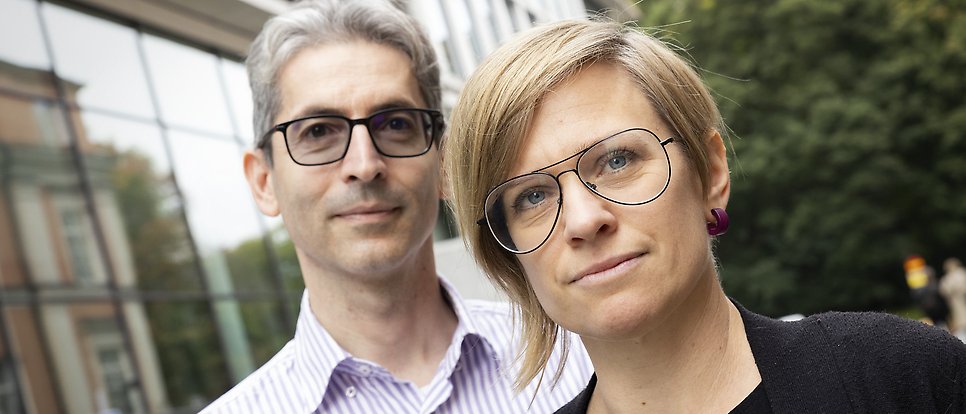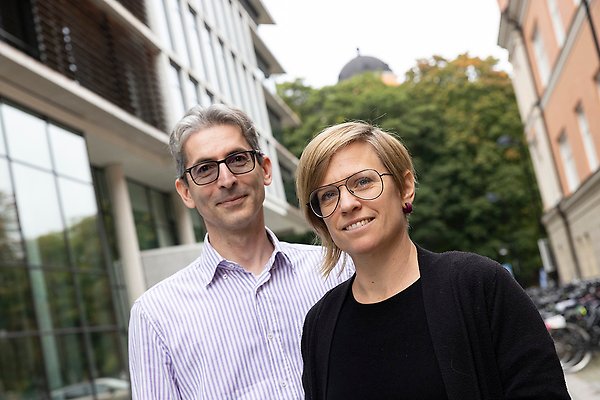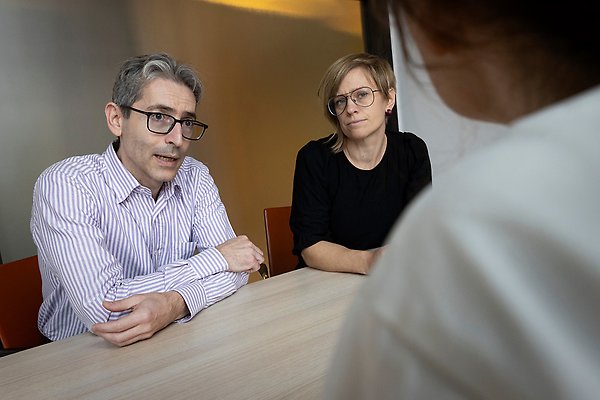Filling the gender dysphoria knowledge gap

Fotis Papadopoulos and Malin Indremo hope to develop and improve transgender care with the results of their research. Photo: Mikael Wallerstedt
The number of people seeking treatment for gender dysphoria has increased significantly. But what is this down to? And how are the people undergoing treatment feeling? Fotis Papadopoulos and Malin Indremo hope to contribute to improved treatment and new knowledge in an increasingly polarised debate.
Gender dysphoria is a psychiatric diagnosis in which a person feels distress at the fact that their gender identity does not match their registered sex. The Department of Medical Sciences is conducting research to investigate the effects of the care provided to this group of patients through a variety of studies.
“There are still many knowledge gaps in this area. Most of our studies focus on investigating the outcomes of people with gender dysphoria who seek treatment. How is gender dysphoria itself experienced? What happens with people’s mental health? We will also examine whether there are long-term negative effects, such as side effects that we don’t know about,” explains Papadopoulos, Senior Lecturer in Psychiatry at Uppsala University and Senior Consultant in Psychiatry at Uppsala University Hospital.
Many people seeking psychiatric care
One of the soon-to-be-completed studies examines psychiatric care consumption before and after gender-affirming hormone therapy in young people to try to pinpoint the effect of the treatment on their mental health.
“What we see is that there is an overrepresentation of psychiatric disorders compared to the general population, which persists even after treatment,” notes Indremo, doctoral student in Psychiatry at Uppsala University and Psychologist on the gender dysphoria team at Uppsala University Hospital’s Child and Adolescent Psychiatric Services.
The two researchers highlight several factors as to why the need for psychiatric care remains high even after treatment. Minority stress may be part of the explanation – it is not easy to be transgender, whether you have received treatment or not, as transgender people often face discrimination and harassment.
Indremo also points out that we can’t expect all problems to disappear just because the person receives treatment for their gender dysphoria.
“What does ‘successful treatment’ mean? Many of the people we meet are struggling with anxiety or depression but are very happy with their treatment. We need to consider what expectations we have. If someone has a history of vulnerability to other difficulties, those will not be erased just because they start treatment.”
The study found that around half of those receiving treatment for gender dysphoria also had another psychiatric diagnosis.

The researchers will study aspects such as how gender-affirming treatment influences body satisfaction, mental health and social vulnerability, i.e. the extent to which patients are exposed to discrimination and violence. Photo: Mikael Wallerstedt
Significant increase in people seeking transgender care
Another issue they plan to investigate is the emergence of gender dysphoria. What is this due to? It may explain why the number of people seeking treatment for gender dysphoria has increased so significantly in the last decade. It is not clear at the current time why the increase has been so great.
“The hypotheses put forward include access to care, social acceptance and knowledge of these issues. This makes it easier to identify these concerns in oneself and lowers the threshold for seeking care,” explains Indremo.
She also says that concerns about gender identity are relatively common. Not everyone who seeks treatment ends up with gender dysphoria, rather it can be part of a wider search for identity.
Concept of regret to be studied
The researchers also plan to try and identify how common it is that people who have started or are undergoing treatment no longer want to continue – that they decide to detransition.
“We hope to nuance the concept of regret. There are so many nuances as to why someone may end their treatment or choose to live according to the gender they were assigned at birth. We need to understand the concept better to find out how common it is,” notes Papadopoulos.
Knowing more about the causes that lead to detransitioning increases the chances of identifying people at risk of regretting their decision.
“We need as much information as possible so that we can prevent people from ending up in that position. Who benefits from gender-affirming treatments and who doesn’t?” adds Indremo.
Heated media debate
Regret and transgender care have been widely discussed in the media lately, most recently in SVT’s documentary Transkriget (The Trans War). The two researchers, who also undertake clinical work with the patient group, reject the idea that trans care lacks evidence, or that one meeting is enough to provide a diagnosis and treatment. Instead, their view is that waiting times are far too long; it takes several years for treatment to become available.
“There are many people with strong views who think that care for transgender people is wrong. We don't think so. Knowledge gaps are not unique to transgender care; they also exist in psychiatry and medicine. Healthcare professionals must be able to help the patient in front of them. There is evidence and we have very long experience showing that these treatments help patients,” says Papadopoulos.

SVT’s documentary Transkriget (The Trans War) paints a picture of transgender healthcare driven by patient associations which in some cases accompany patients to appointments. This is not something that either Indremo or Papadopoulos has experienced. Photo: Mikael Wallerstedt
